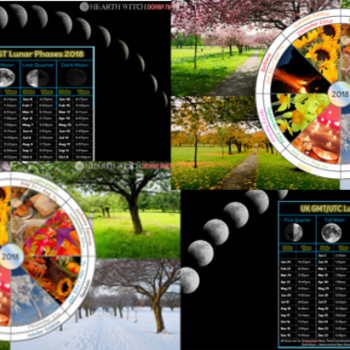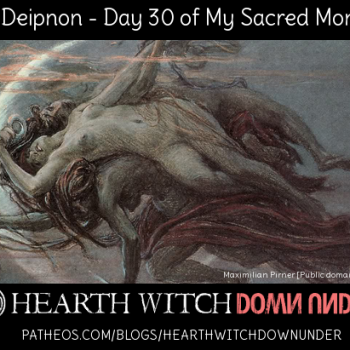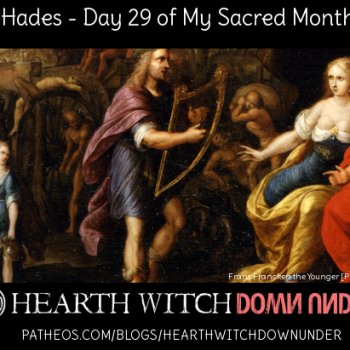Not all Pagans. Not all Paganisms.
It’s something I do myself. I read or hear someone talking about Paganism and they are generalising in some way, and I feel the need to respond to it and point out, “Not all Pagans! Not all Paganisms!” though of course I usually use way more words than that – because where is the fun in pointing out someones wrongness without being elaborate and lecture-y? That’s self-deprecating sarcasm in case you’re wondering.
I read Becketts There Are No Scapegoats in (Modern) Paganism and I had the same reactionary thought about his post there – Not all Pagans, Not all Paganisms! First to my mind was the idea in Hellenism, scapegoats have a fairly prominent role to play actually, in more ways than one. Dver points it out in her comment on the post.
I get your main point here, but have to disagree with the statement of your title. In Hellenic polytheism, there is definitely a concept of a scapegoat ritual. It appears in the Thargelia festival for Apollon, where two people are chosen to represent the community, feasted and adorned, and then driven out violently. It’s a cathartic, purification ritual. This was an ancient practice (that has been replicated to some degree by some modern Hellenic polytheists), so it’s definitely not just a mimicking of Abrahamic religions or something.
And that’s not the only example of scapegoating in Hellenism – the act of taking a dog, letting every member of the family touch it before sacrificing it to Hekate for the Deipnon, was also a scapegoat act. Touching the dog is thought to be a way of symbolically transferring your own “sins” onto the dog, and then sacrificing the dog would get rid of those sins and appease the Gods in one fell swoop. Of course we (or most of us) don’t do that now! Not many people have spare dogs lying around that they don’t care about and are willing to sacrifice. But some modern Hellenes will do it symbolically, by using a dog figurine of some sort. So the scapegoat (scapedog?) act is still in use by modern Pagans.

Missing the Point?
Becketts post originally did not have “Modern” in the title, it was added because it was pointed out that the ancient Hellenes did indeed have scapegoats, long before Christianity or Abrahamic influence. But of course, some modern Hellenes still practice scapegoating so the title still doesn’t stand. And he has now written a post about everyone missing the point about scapegoating.
But the thing is, no one did miss the point, or, maybe some did, but most didn’t. Everyone got the point he was trying to make, they just chose to focus on other parts of his post instead of his main point. Because, that’s what some of us do when given the opportunity to say , “Not all Pagans!” I do it a lot, many of us Pagans do it, even if we don’t realise it. I didn’t make any comments on his initial post, because while I had the same initial reaction as Dver about Hellenism, I personally chose to focus on his main point rather than the other bits and pieces I could have reacted to – and everyone else did react to.
It’s not a new thing, it has happened before, recently. One need only look at the numerous and angry reactions to Rhyds Confronting the New Right on G&R to see this sort of thing in action. Rhyd wrote about the New Right infiltrating Paganisms, especially in the form of racism, and he pointed out some of the groups and religions within Paganism that he sees as more vulnerable to such infiltration. Most people chose to focus on and react to his list of “vulnerable” groups, because he wrote in such a way as to make it seem like these groups are not just vulnerable, they are already down right racist and horrible.
You will find a lot of link backs to that article by Rhyd, but only a small minority of those link backs will be about confronting and avoiding racism in our religions – the majority are more along the lines of, “Let’s all hate Rhyd!” That’s possibly a generalisation.
No one missed the point. Everyone knows that he is right in most of what he wrote – whether they agree it’s a problem or not is another matter. No, everyone got his point. But most people didn’t care about that point, because there were other things in his article that were more important to them.
Not All Pagans!
And that’s not wrong or bad. It’s normal. We all have our priorities, and while it seems like racism should be the priority over “Not all Pagans!” the truth is, the idea of “Not all Pagans” is practically in our blood, our Paganised blood. It’s like, when you become Pagan, especially if you are escaping a religion you hate/d, you feel this need to defend your new religion, defend your right to be free to believe and act however you want within your new religion. I was not raised in some horrible religious home, I was raised Agnostic and was free to believe in whatever I wanted – but even I had this problem when I entered Paganism, and still do when being reactionary instead of thoughtful. Not all Pagans is the rally cry of thousands of people who can’t stand the idea of Paganism becoming fundamentalist, even for a moment, even in one single individual Pagan. But that’s not all it is.
For a lot of us, when we begin our journey into Paganism we are confronted with truths that we eventually discover are nothing but misconceptions at best, outright lies at worst. The Burning Times, Christians stole our festivals, Christians did this to us and that to us and…. Christians everything. A lot of us begin with the idea that the Wiccan Rede is universally Pagan, but it’s not. The same with a few other things too, lies and misconceptions. And then there are the lies and misconceptions that exist outside of Paganism – baby sacrificing, devil worshipping cannibals is all we are, to some people.
It becomes important to us to fight these things, the lies we were fed within Paganism and the lies outside of it. We must make other Pagans understand that our own unique form of Paganism is okay (and keep out fundamentalism) and we must make everyone else understand that Pagans are not devil worshippers (which makes me want to say, Not all Pagans, because hey, devil worship is legit to some Pagans, no deity or creature is off limits in Paganism). We feel this need to fight the lies because we understand how limiting and damaging the lies can be. Internal lies can make it difficult for us to grow in our religions. External lies can cause people to have their homes vandalised, their lives and family endangered.
I should probably caveat and say in regards to all of the above – Not all Pagans!
Not All Paganisms!
And then there are those of us in more specific religions within (or outside of but always considered part of) Paganism, such as Heathenry and Hellenismos. For us there is the secondary struggle of making sure people understand that our religion, as a whole, can be very different to neo-Paganism. While we fit under the Pagan Umbrella, or Tent or whatever, we are also our own umbrellas, with our own very different and often specific rules, beliefs,, practices and lore. It can be hard for us, we are considered Pagan, whether we want to be or not, and it’s really no fun to be told we should be following the Wiccan Rede by some not-even-a-Wiccan upstart when our Gods may be saying, “Hey, ever read about how they used to sacrifice animals to Me? Huh? HUH? DID YOU?”
It can be doubly hard for us in some ways.
But the thing is, even those Paganisms that are not more complete religions such as Hellenism or Heathenry are still individual and unique compared to other Paganisms. It’s not just us. But even when we are in our own religions, we are still choosing (in many cases) to be part of the Pagan Community – that community that is All Paganisms.
Often when someone writes a post that generalises Paganism, they really aren’t generalising all Paganisms, they are generalising Paganism, without the plural S. And there is a difference.
Not all Paganisms? Sure, not all religions within Paganism are the same, but not all of Paganism is represented by your religion. And just because someone uses the word “Paganism” when making a sweeping statement, doesn’t mean they meant Hellenism or Heathenry or Wicca or Kemeticism or Whatever. Did they mention your religion, or did you just assume they meant your religion too?
Prioritise
It helps to add words like, “some” or “many” or “a lot of” or even, “it seems like” when making what could be sweeping statements. But at the same time, shouldn’t we all be able to read such caveats between the lines? Especially with writers we know well – as much as you can know a blogger you’ve never met – having read a lot of their posts before.
I don’t suggest assuming the writer knows all the facts, so certainly enlighten them – Beckett admits to not knowing about scapegoating in Hellenism, he learned something from that information provided. But I do suggest not being reactive when giving out the information and to not forget the point that was being made in the first place. Don’t let your “Not all Pagans!” feelings override the purpose of whatever you’re reading. Don’t forget to look at and think about the actual message being given to you and considering if it is worth something to you.
Because when you think about it, Confronting the New Right could have been something that made us all think about racism in Paganism a bit more deeply, helped us be aware of what could be happening, what we might encounter and even how to counteract it. But it hasn’t done that, at least not as much as it could have, and that is a bit sad.
And when you read Becketts Scapegoat post, you shouldn’t have to read his follow up post to realise he is right. We should own our actions, no one is to blame for what we do and scapegoats may be great in the traditional sense for some of our religions – but are we really going to act like we can be complete jerks in life, to people or to the Gods and just get away with it if we slaughter a dog or smash a dog figurine? I am Hellenic, but I can’t agree with the idea of getting away with and expunging guilt for my “bad” actions and behaviour by using a scapegoat – even if I may at some point practice the tradition (though I don’t see myself sacrificing any dogs).
We all have our little triggers that make us react before thinking things through fully – mine actually is certain lies and misconceptions that keep being spread within Paganism. But it is worth it to try to think before letting our triggers control our actions. I can’t promise I will always do so, but I do try and continue to try. And that’s better than being unaware of what I am doing and why.
I wonder… Which point you are going to take from this post?
















